Sociology of Health: Biomedicine, Social Models, and Medicalization
VerifiedAdded on 2022/12/19
|9
|1907
|1
Report
AI Summary
This report delves into the sociology of health, examining the interplay between biomedicine, social models, and healthcare practices within the context of British society. It begins by defining key terms like health, illness, and biomedicine, highlighting the shift towards a bio-psychosocial model that considers social and psychological influences on health. The main body explores various sociological perspectives, including the social model, conflict theory, and functionalist views, and their relevance to biomedicine. It also discusses medicalization, the impact of Rene Descartes' ideas, and the evolution of the biomedical model. The report further investigates the bio-psychosocial model, its origins, and its influence on healthcare, concluding that biomedicine is an effective healthcare approach influenced by sociological factors, which include social models, conflict theory, and medicalization. The report also includes a discussion of the role of the germ theory and the use of antibiotics. The study concludes that the combination of social factors with the biomedical approach leads to effective healthcare practices.
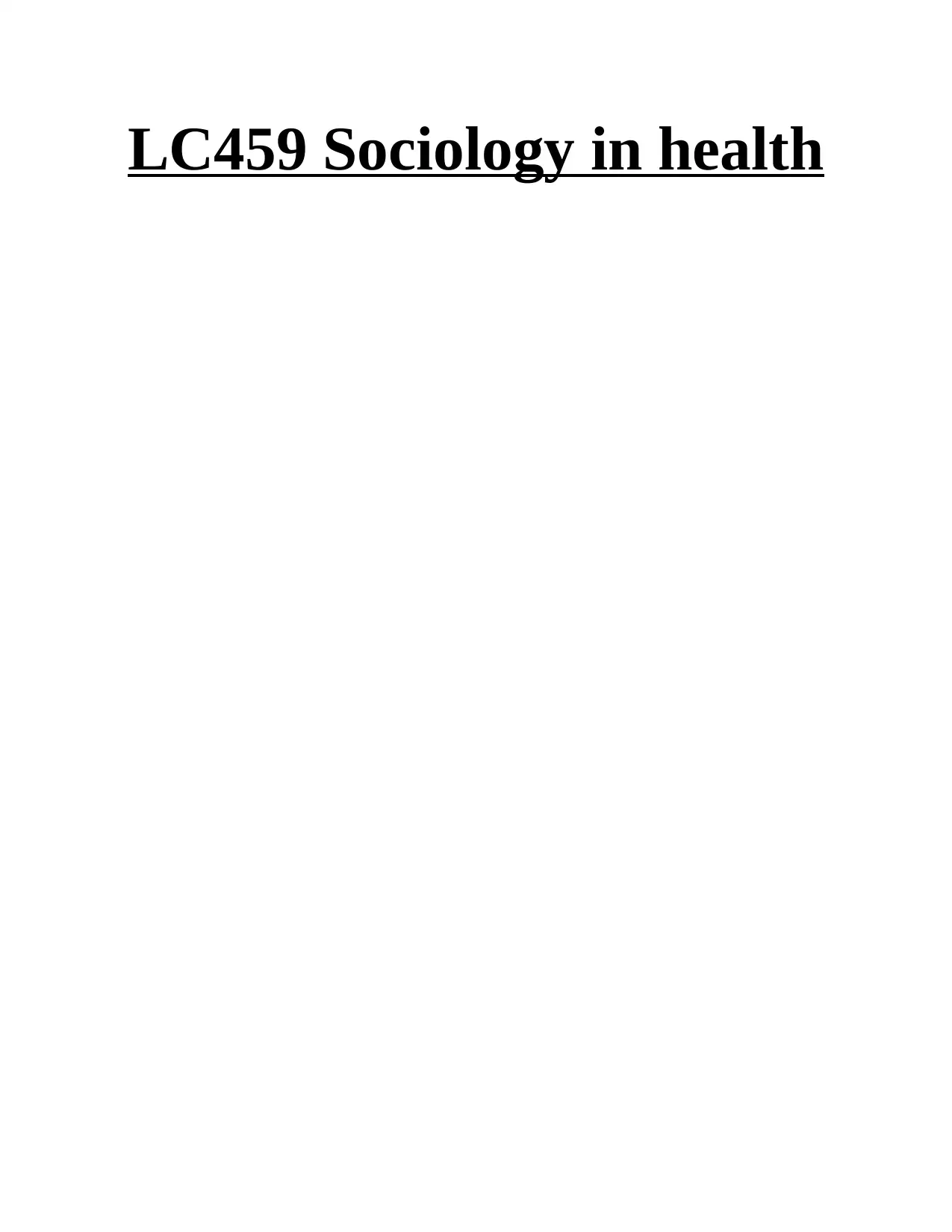
LC459 Sociology in health
Paraphrase This Document
Need a fresh take? Get an instant paraphrase of this document with our AI Paraphraser
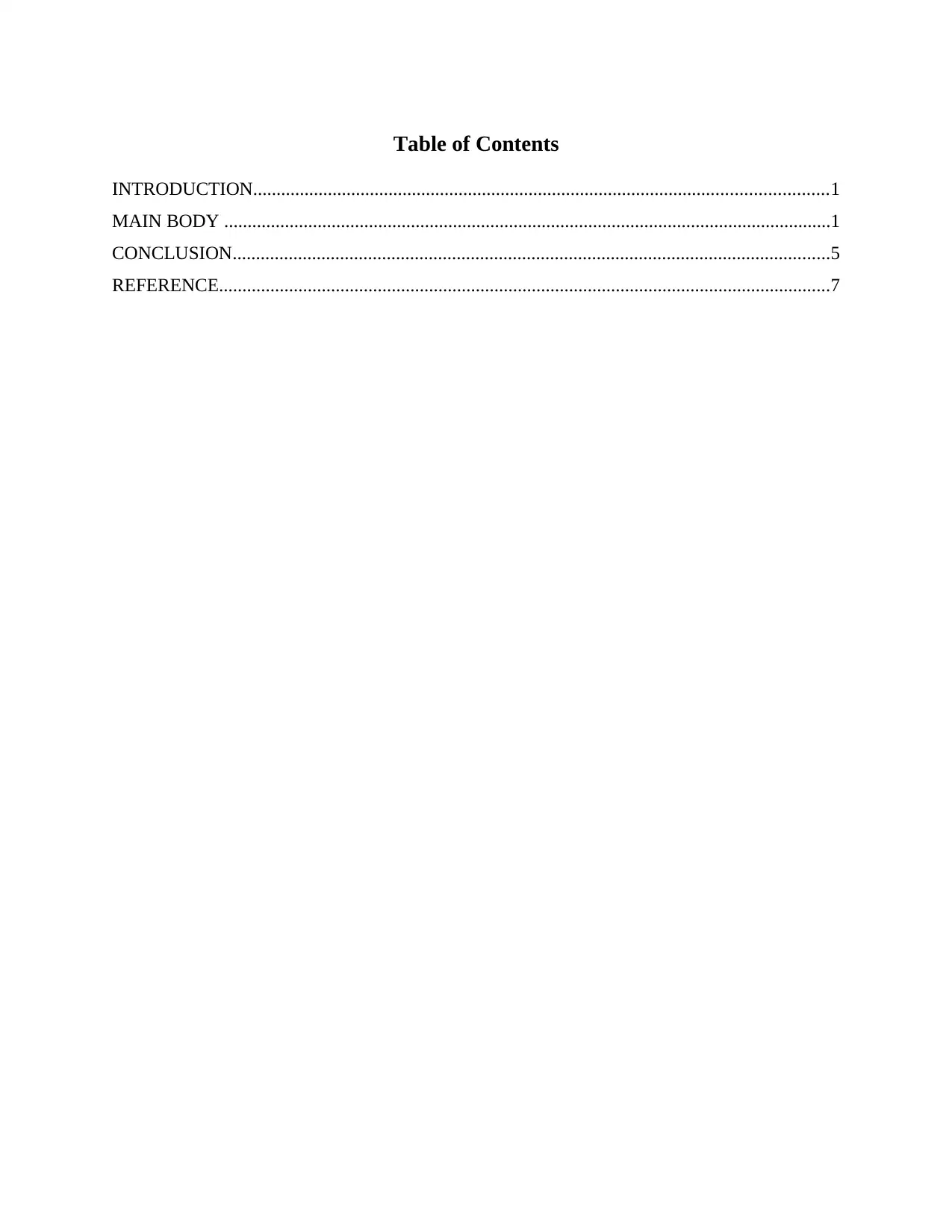
Table of Contents
INTRODUCTION...........................................................................................................................1
MAIN BODY ..................................................................................................................................1
CONCLUSION................................................................................................................................5
REFERENCE...................................................................................................................................7
INTRODUCTION...........................................................................................................................1
MAIN BODY ..................................................................................................................................1
CONCLUSION................................................................................................................................5
REFERENCE...................................................................................................................................7
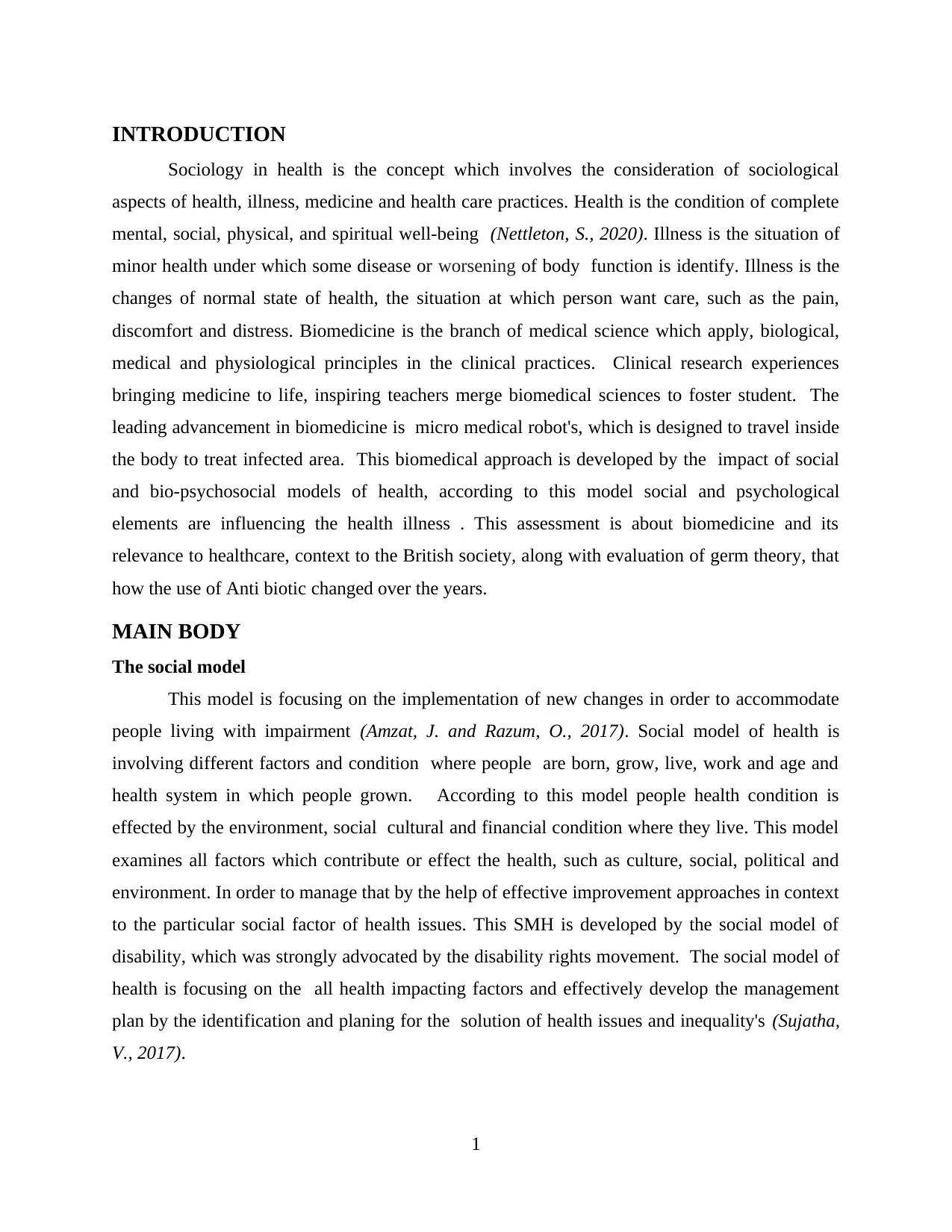
INTRODUCTION
Sociology in health is the concept which involves the consideration of sociological
aspects of health, illness, medicine and health care practices. Health is the condition of complete
mental, social, physical, and spiritual well-being (Nettleton, S., 2020). Illness is the situation of
minor health under which some disease or worsening of body function is identify. Illness is the
changes of normal state of health, the situation at which person want care, such as the pain,
discomfort and distress. Biomedicine is the branch of medical science which apply, biological,
medical and physiological principles in the clinical practices. Clinical research experiences
bringing medicine to life, inspiring teachers merge biomedical sciences to foster student. The
leading advancement in biomedicine is micro medical robot's, which is designed to travel inside
the body to treat infected area. This biomedical approach is developed by the impact of social
and bio-psychosocial models of health, according to this model social and psychological
elements are influencing the health illness . This assessment is about biomedicine and its
relevance to healthcare, context to the British society, along with evaluation of germ theory, that
how the use of Anti biotic changed over the years.
MAIN BODY
The social model
This model is focusing on the implementation of new changes in order to accommodate
people living with impairment (Amzat, J. and Razum, O., 2017). Social model of health is
involving different factors and condition where people are born, grow, live, work and age and
health system in which people grown. According to this model people health condition is
effected by the environment, social cultural and financial condition where they live. This model
examines all factors which contribute or effect the health, such as culture, social, political and
environment. In order to manage that by the help of effective improvement approaches in context
to the particular social factor of health issues. This SMH is developed by the social model of
disability, which was strongly advocated by the disability rights movement. The social model of
health is focusing on the all health impacting factors and effectively develop the management
plan by the identification and planing for the solution of health issues and inequality's (Sujatha,
V., 2017).
1
Sociology in health is the concept which involves the consideration of sociological
aspects of health, illness, medicine and health care practices. Health is the condition of complete
mental, social, physical, and spiritual well-being (Nettleton, S., 2020). Illness is the situation of
minor health under which some disease or worsening of body function is identify. Illness is the
changes of normal state of health, the situation at which person want care, such as the pain,
discomfort and distress. Biomedicine is the branch of medical science which apply, biological,
medical and physiological principles in the clinical practices. Clinical research experiences
bringing medicine to life, inspiring teachers merge biomedical sciences to foster student. The
leading advancement in biomedicine is micro medical robot's, which is designed to travel inside
the body to treat infected area. This biomedical approach is developed by the impact of social
and bio-psychosocial models of health, according to this model social and psychological
elements are influencing the health illness . This assessment is about biomedicine and its
relevance to healthcare, context to the British society, along with evaluation of germ theory, that
how the use of Anti biotic changed over the years.
MAIN BODY
The social model
This model is focusing on the implementation of new changes in order to accommodate
people living with impairment (Amzat, J. and Razum, O., 2017). Social model of health is
involving different factors and condition where people are born, grow, live, work and age and
health system in which people grown. According to this model people health condition is
effected by the environment, social cultural and financial condition where they live. This model
examines all factors which contribute or effect the health, such as culture, social, political and
environment. In order to manage that by the help of effective improvement approaches in context
to the particular social factor of health issues. This SMH is developed by the social model of
disability, which was strongly advocated by the disability rights movement. The social model of
health is focusing on the all health impacting factors and effectively develop the management
plan by the identification and planing for the solution of health issues and inequality's (Sujatha,
V., 2017).
1
⊘ This is a preview!⊘
Do you want full access?
Subscribe today to unlock all pages.

Trusted by 1+ million students worldwide
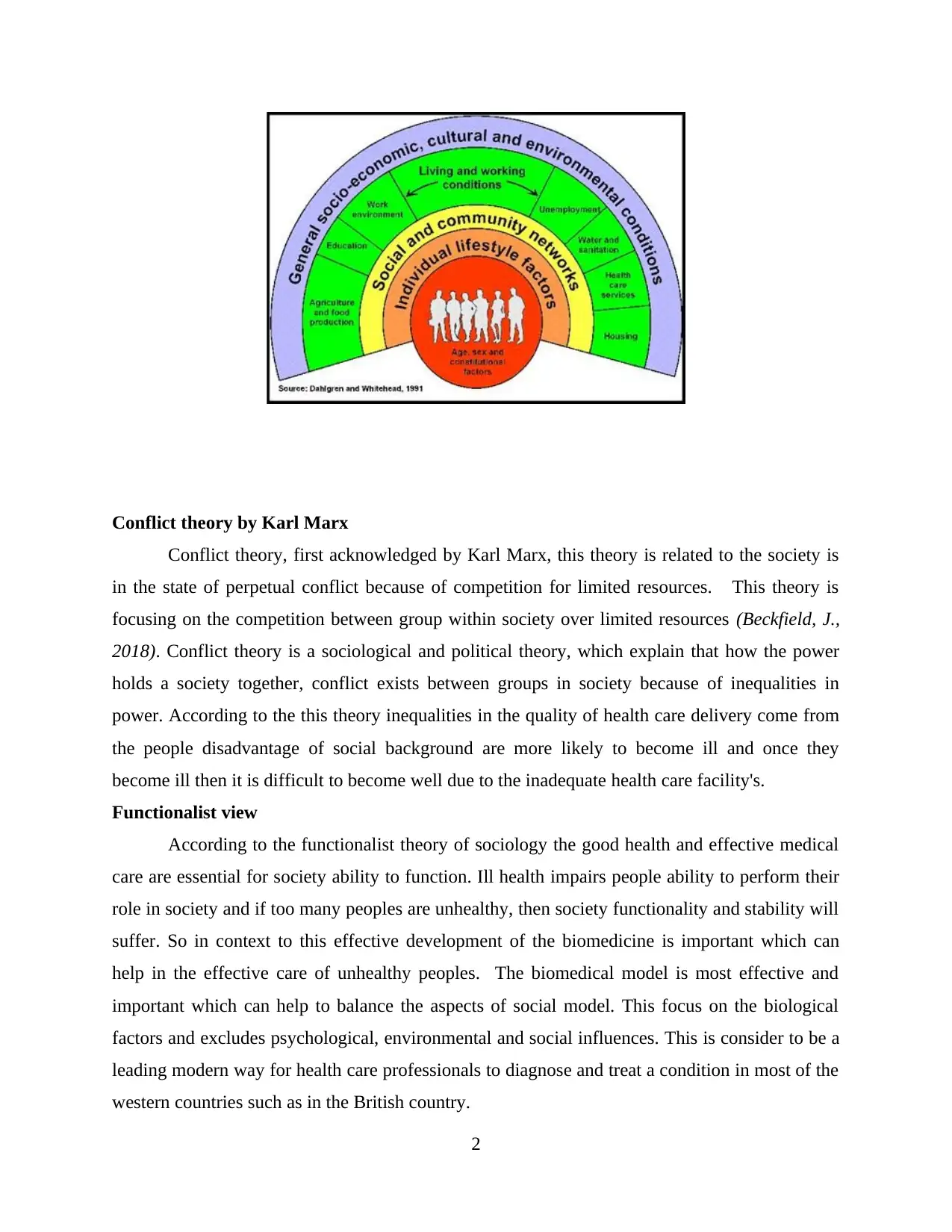
Conflict theory by Karl Marx
Conflict theory, first acknowledged by Karl Marx, this theory is related to the society is
in the state of perpetual conflict because of competition for limited resources. This theory is
focusing on the competition between group within society over limited resources (Beckfield, J.,
2018). Conflict theory is a sociological and political theory, which explain that how the power
holds a society together, conflict exists between groups in society because of inequalities in
power. According to the this theory inequalities in the quality of health care delivery come from
the people disadvantage of social background are more likely to become ill and once they
become ill then it is difficult to become well due to the inadequate health care facility's.
Functionalist view
According to the functionalist theory of sociology the good health and effective medical
care are essential for society ability to function. Ill health impairs people ability to perform their
role in society and if too many peoples are unhealthy, then society functionality and stability will
suffer. So in context to this effective development of the biomedicine is important which can
help in the effective care of unhealthy peoples. The biomedical model is most effective and
important which can help to balance the aspects of social model. This focus on the biological
factors and excludes psychological, environmental and social influences. This is consider to be a
leading modern way for health care professionals to diagnose and treat a condition in most of the
western countries such as in the British country.
2
Conflict theory, first acknowledged by Karl Marx, this theory is related to the society is
in the state of perpetual conflict because of competition for limited resources. This theory is
focusing on the competition between group within society over limited resources (Beckfield, J.,
2018). Conflict theory is a sociological and political theory, which explain that how the power
holds a society together, conflict exists between groups in society because of inequalities in
power. According to the this theory inequalities in the quality of health care delivery come from
the people disadvantage of social background are more likely to become ill and once they
become ill then it is difficult to become well due to the inadequate health care facility's.
Functionalist view
According to the functionalist theory of sociology the good health and effective medical
care are essential for society ability to function. Ill health impairs people ability to perform their
role in society and if too many peoples are unhealthy, then society functionality and stability will
suffer. So in context to this effective development of the biomedicine is important which can
help in the effective care of unhealthy peoples. The biomedical model is most effective and
important which can help to balance the aspects of social model. This focus on the biological
factors and excludes psychological, environmental and social influences. This is consider to be a
leading modern way for health care professionals to diagnose and treat a condition in most of the
western countries such as in the British country.
2
Paraphrase This Document
Need a fresh take? Get an instant paraphrase of this document with our AI Paraphraser
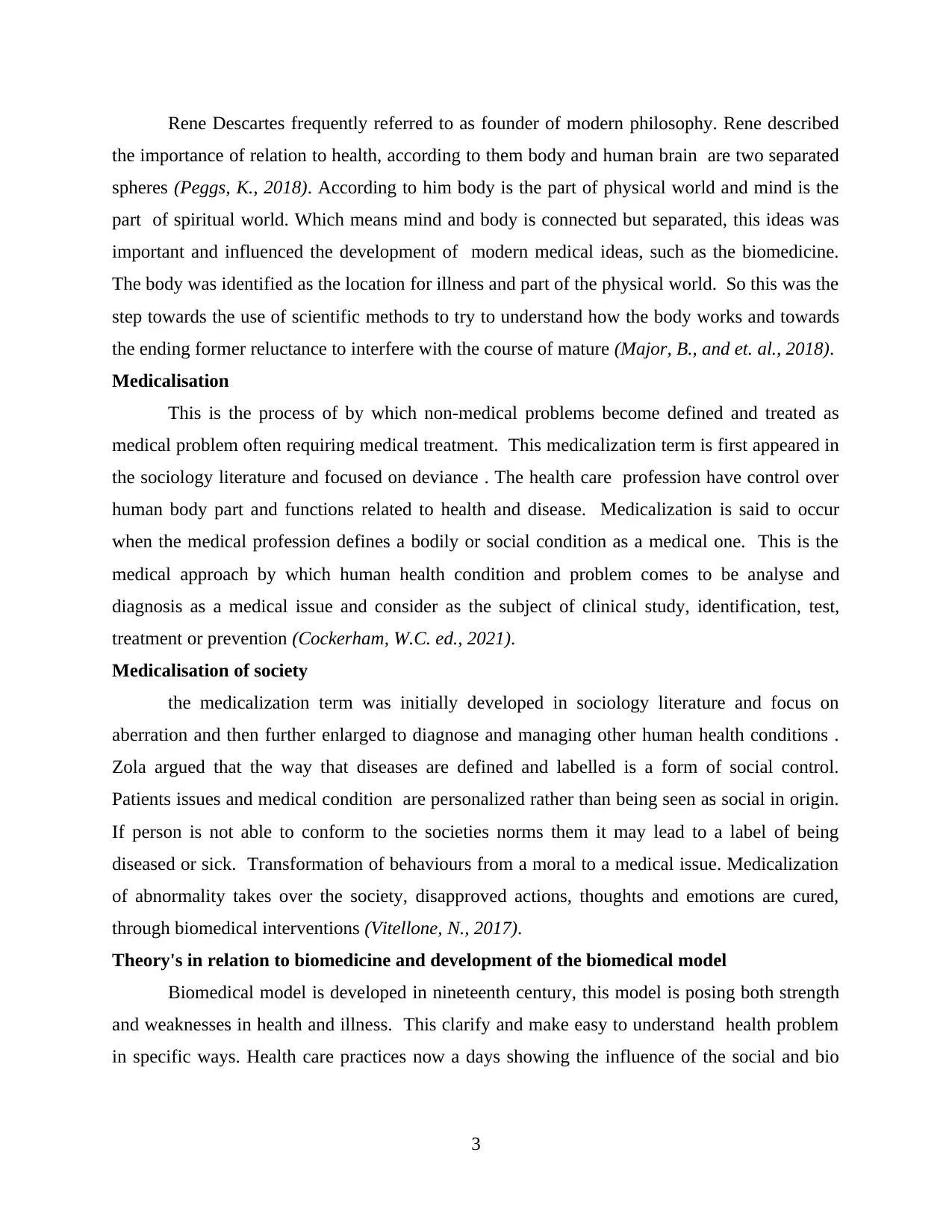
Rene Descartes frequently referred to as founder of modern philosophy. Rene described
the importance of relation to health, according to them body and human brain are two separated
spheres (Peggs, K., 2018). According to him body is the part of physical world and mind is the
part of spiritual world. Which means mind and body is connected but separated, this ideas was
important and influenced the development of modern medical ideas, such as the biomedicine.
The body was identified as the location for illness and part of the physical world. So this was the
step towards the use of scientific methods to try to understand how the body works and towards
the ending former reluctance to interfere with the course of mature (Major, B., and et. al., 2018).
Medicalisation
This is the process of by which non-medical problems become defined and treated as
medical problem often requiring medical treatment. This medicalization term is first appeared in
the sociology literature and focused on deviance . The health care profession have control over
human body part and functions related to health and disease. Medicalization is said to occur
when the medical profession defines a bodily or social condition as a medical one. This is the
medical approach by which human health condition and problem comes to be analyse and
diagnosis as a medical issue and consider as the subject of clinical study, identification, test,
treatment or prevention (Cockerham, W.C. ed., 2021).
Medicalisation of society
the medicalization term was initially developed in sociology literature and focus on
aberration and then further enlarged to diagnose and managing other human health conditions .
Zola argued that the way that diseases are defined and labelled is a form of social control.
Patients issues and medical condition are personalized rather than being seen as social in origin.
If person is not able to conform to the societies norms them it may lead to a label of being
diseased or sick. Transformation of behaviours from a moral to a medical issue. Medicalization
of abnormality takes over the society, disapproved actions, thoughts and emotions are cured,
through biomedical interventions (Vitellone, N., 2017).
Theory's in relation to biomedicine and development of the biomedical model
Biomedical model is developed in nineteenth century, this model is posing both strength
and weaknesses in health and illness. This clarify and make easy to understand health problem
in specific ways. Health care practices now a days showing the influence of the social and bio
3
the importance of relation to health, according to them body and human brain are two separated
spheres (Peggs, K., 2018). According to him body is the part of physical world and mind is the
part of spiritual world. Which means mind and body is connected but separated, this ideas was
important and influenced the development of modern medical ideas, such as the biomedicine.
The body was identified as the location for illness and part of the physical world. So this was the
step towards the use of scientific methods to try to understand how the body works and towards
the ending former reluctance to interfere with the course of mature (Major, B., and et. al., 2018).
Medicalisation
This is the process of by which non-medical problems become defined and treated as
medical problem often requiring medical treatment. This medicalization term is first appeared in
the sociology literature and focused on deviance . The health care profession have control over
human body part and functions related to health and disease. Medicalization is said to occur
when the medical profession defines a bodily or social condition as a medical one. This is the
medical approach by which human health condition and problem comes to be analyse and
diagnosis as a medical issue and consider as the subject of clinical study, identification, test,
treatment or prevention (Cockerham, W.C. ed., 2021).
Medicalisation of society
the medicalization term was initially developed in sociology literature and focus on
aberration and then further enlarged to diagnose and managing other human health conditions .
Zola argued that the way that diseases are defined and labelled is a form of social control.
Patients issues and medical condition are personalized rather than being seen as social in origin.
If person is not able to conform to the societies norms them it may lead to a label of being
diseased or sick. Transformation of behaviours from a moral to a medical issue. Medicalization
of abnormality takes over the society, disapproved actions, thoughts and emotions are cured,
through biomedical interventions (Vitellone, N., 2017).
Theory's in relation to biomedicine and development of the biomedical model
Biomedical model is developed in nineteenth century, this model is posing both strength
and weaknesses in health and illness. This clarify and make easy to understand health problem
in specific ways. Health care practices now a days showing the influence of the social and bio
3
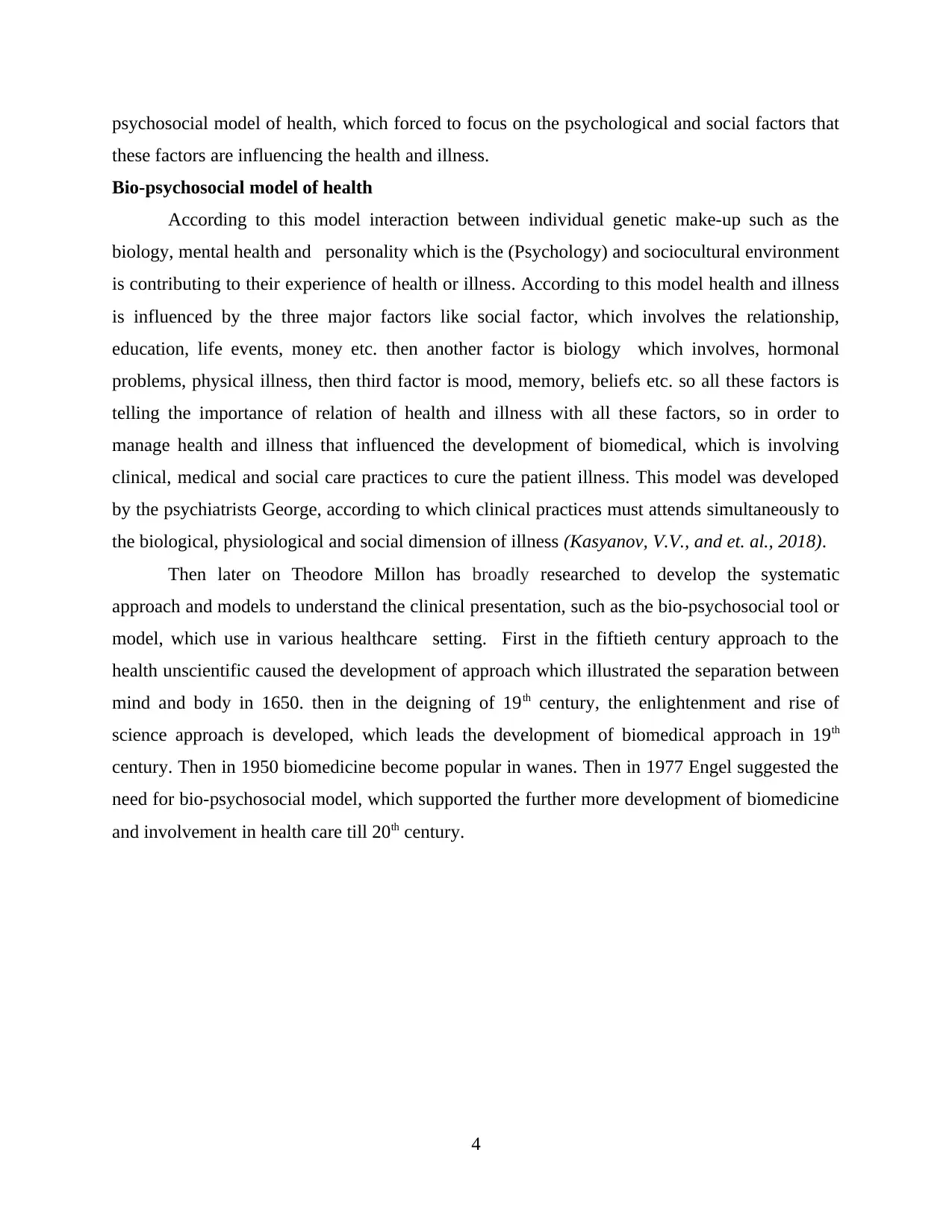
psychosocial model of health, which forced to focus on the psychological and social factors that
these factors are influencing the health and illness.
Bio-psychosocial model of health
According to this model interaction between individual genetic make-up such as the
biology, mental health and personality which is the (Psychology) and sociocultural environment
is contributing to their experience of health or illness. According to this model health and illness
is influenced by the three major factors like social factor, which involves the relationship,
education, life events, money etc. then another factor is biology which involves, hormonal
problems, physical illness, then third factor is mood, memory, beliefs etc. so all these factors is
telling the importance of relation of health and illness with all these factors, so in order to
manage health and illness that influenced the development of biomedical, which is involving
clinical, medical and social care practices to cure the patient illness. This model was developed
by the psychiatrists George, according to which clinical practices must attends simultaneously to
the biological, physiological and social dimension of illness (Kasyanov, V.V., and et. al., 2018).
Then later on Theodore Millon has broadly researched to develop the systematic
approach and models to understand the clinical presentation, such as the bio-psychosocial tool or
model, which use in various healthcare setting. First in the fiftieth century approach to the
health unscientific caused the development of approach which illustrated the separation between
mind and body in 1650. then in the deigning of 19th century, the enlightenment and rise of
science approach is developed, which leads the development of biomedical approach in 19th
century. Then in 1950 biomedicine become popular in wanes. Then in 1977 Engel suggested the
need for bio-psychosocial model, which supported the further more development of biomedicine
and involvement in health care till 20th century.
4
these factors are influencing the health and illness.
Bio-psychosocial model of health
According to this model interaction between individual genetic make-up such as the
biology, mental health and personality which is the (Psychology) and sociocultural environment
is contributing to their experience of health or illness. According to this model health and illness
is influenced by the three major factors like social factor, which involves the relationship,
education, life events, money etc. then another factor is biology which involves, hormonal
problems, physical illness, then third factor is mood, memory, beliefs etc. so all these factors is
telling the importance of relation of health and illness with all these factors, so in order to
manage health and illness that influenced the development of biomedical, which is involving
clinical, medical and social care practices to cure the patient illness. This model was developed
by the psychiatrists George, according to which clinical practices must attends simultaneously to
the biological, physiological and social dimension of illness (Kasyanov, V.V., and et. al., 2018).
Then later on Theodore Millon has broadly researched to develop the systematic
approach and models to understand the clinical presentation, such as the bio-psychosocial tool or
model, which use in various healthcare setting. First in the fiftieth century approach to the
health unscientific caused the development of approach which illustrated the separation between
mind and body in 1650. then in the deigning of 19th century, the enlightenment and rise of
science approach is developed, which leads the development of biomedical approach in 19th
century. Then in 1950 biomedicine become popular in wanes. Then in 1977 Engel suggested the
need for bio-psychosocial model, which supported the further more development of biomedicine
and involvement in health care till 20th century.
4
⊘ This is a preview!⊘
Do you want full access?
Subscribe today to unlock all pages.

Trusted by 1+ million students worldwide
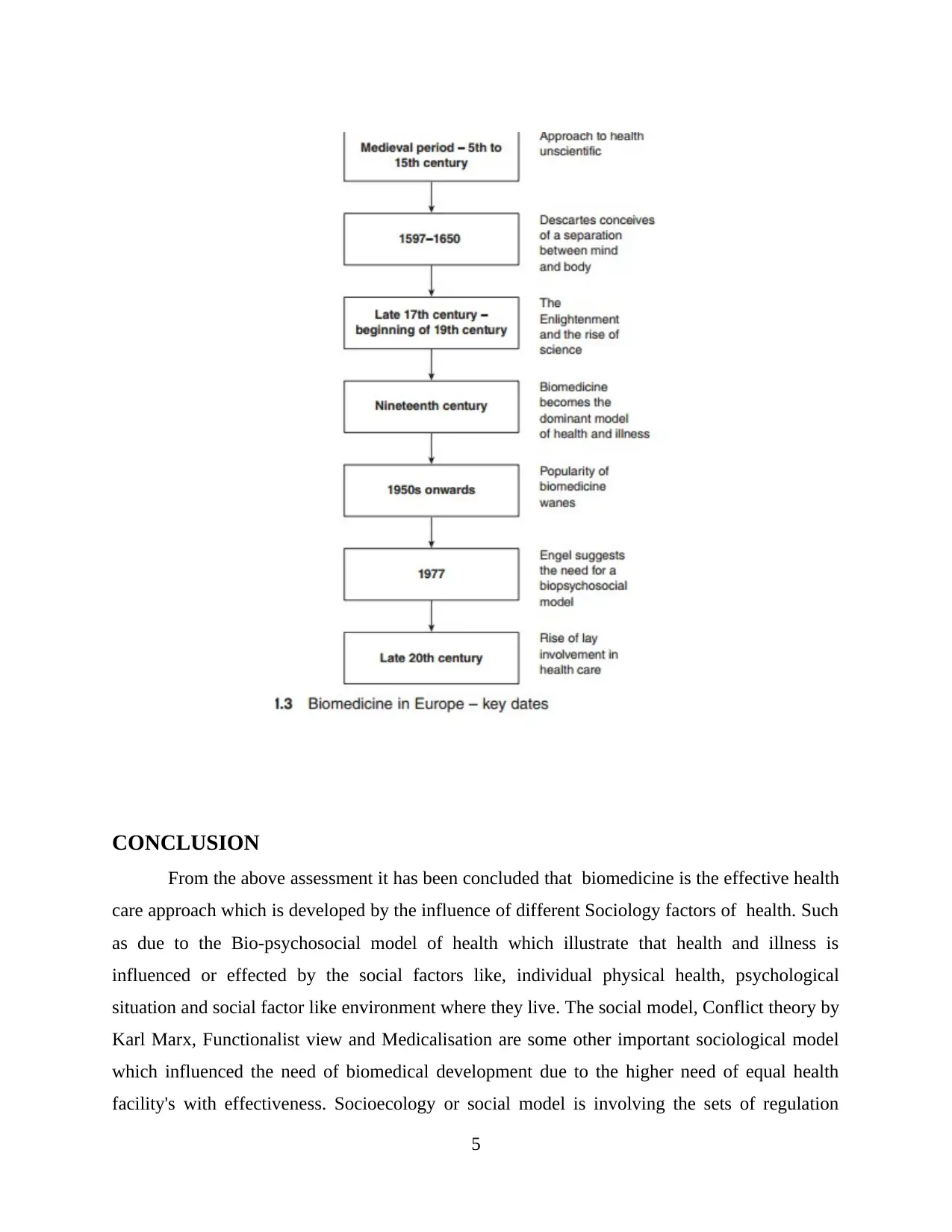
CONCLUSION
From the above assessment it has been concluded that biomedicine is the effective health
care approach which is developed by the influence of different Sociology factors of health. Such
as due to the Bio-psychosocial model of health which illustrate that health and illness is
influenced or effected by the social factors like, individual physical health, psychological
situation and social factor like environment where they live. The social model, Conflict theory by
Karl Marx, Functionalist view and Medicalisation are some other important sociological model
which influenced the need of biomedical development due to the higher need of equal health
facility's with effectiveness. Socioecology or social model is involving the sets of regulation
5
From the above assessment it has been concluded that biomedicine is the effective health
care approach which is developed by the influence of different Sociology factors of health. Such
as due to the Bio-psychosocial model of health which illustrate that health and illness is
influenced or effected by the social factors like, individual physical health, psychological
situation and social factor like environment where they live. The social model, Conflict theory by
Karl Marx, Functionalist view and Medicalisation are some other important sociological model
which influenced the need of biomedical development due to the higher need of equal health
facility's with effectiveness. Socioecology or social model is involving the sets of regulation
5
Paraphrase This Document
Need a fresh take? Get an instant paraphrase of this document with our AI Paraphraser
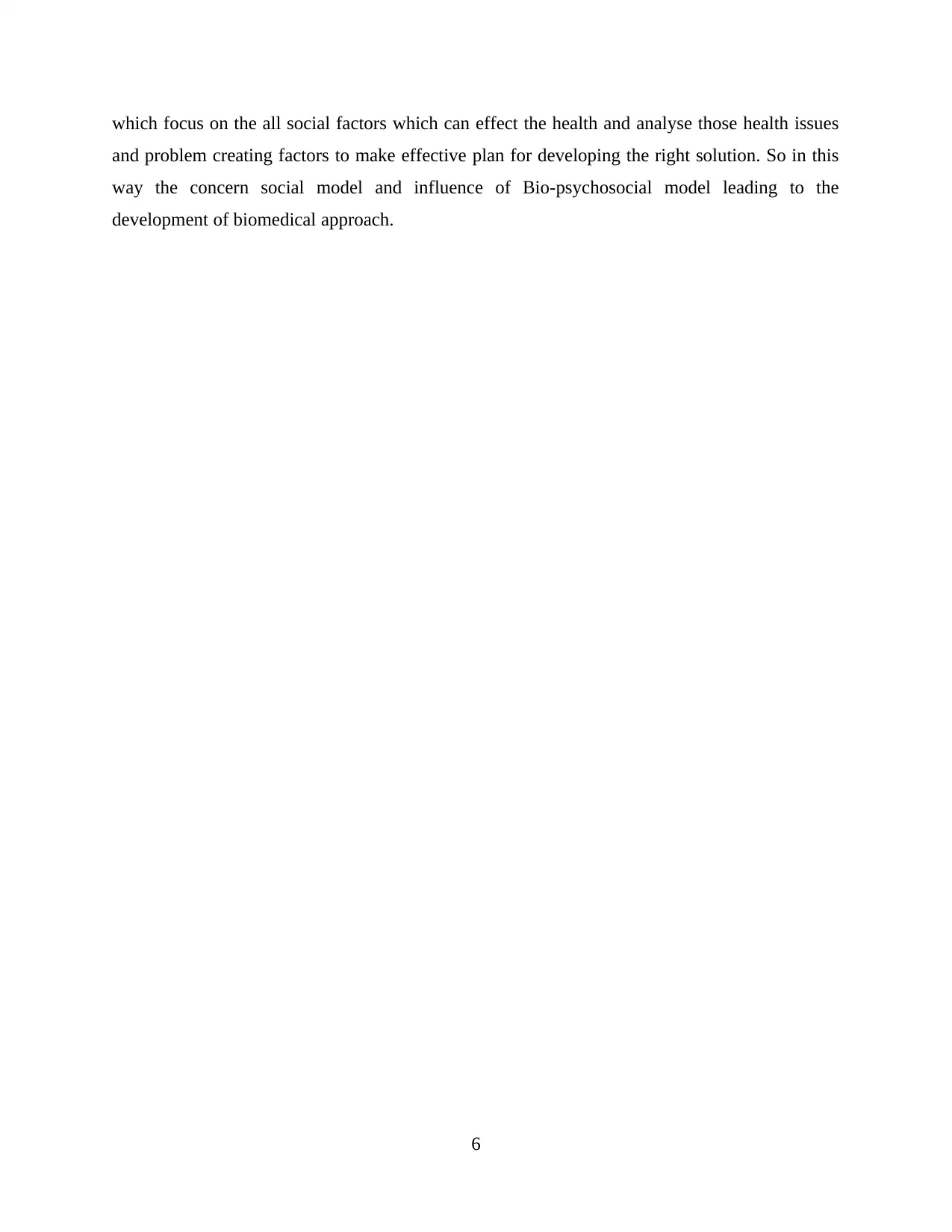
which focus on the all social factors which can effect the health and analyse those health issues
and problem creating factors to make effective plan for developing the right solution. So in this
way the concern social model and influence of Bio-psychosocial model leading to the
development of biomedical approach.
6
and problem creating factors to make effective plan for developing the right solution. So in this
way the concern social model and influence of Bio-psychosocial model leading to the
development of biomedical approach.
6
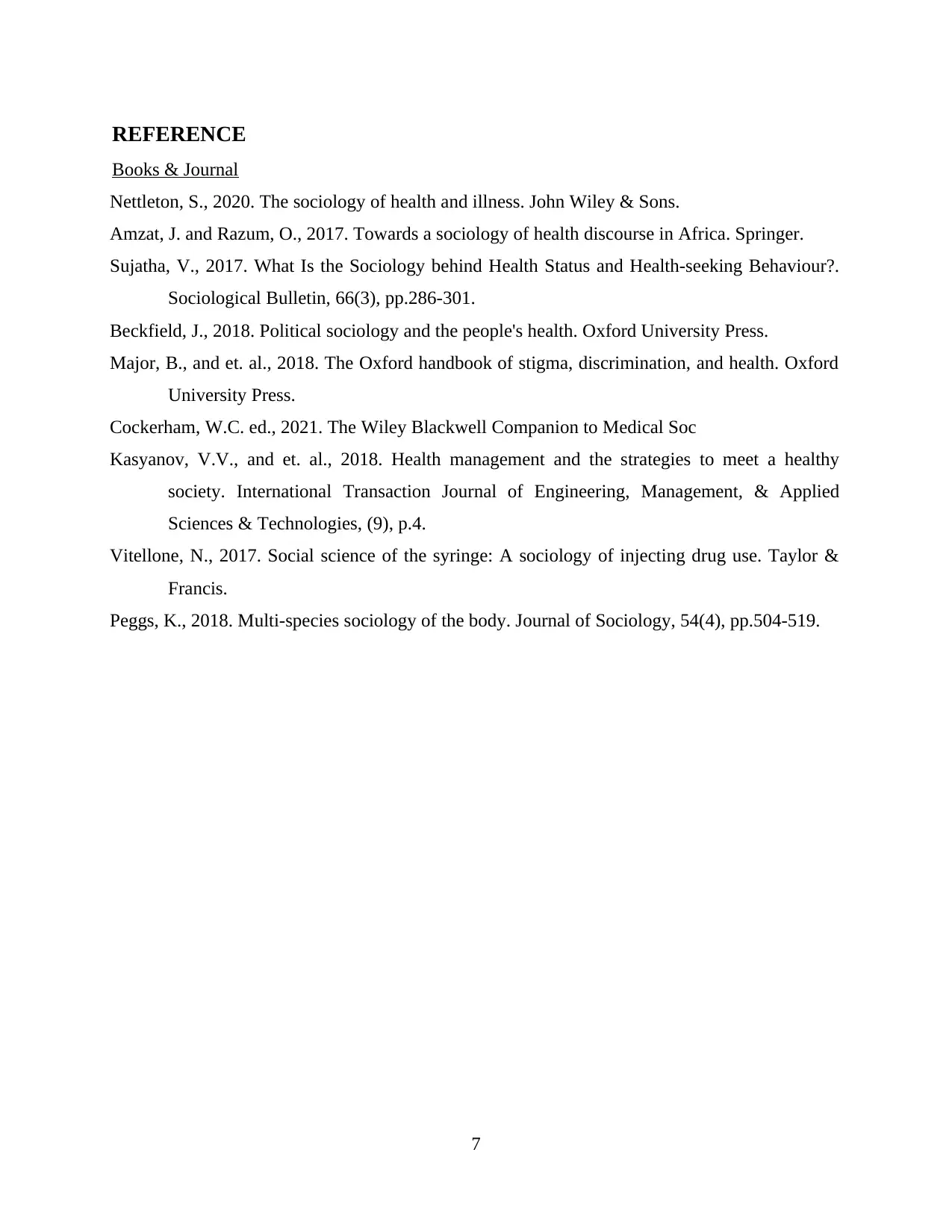
REFERENCE
Books & Journal
Nettleton, S., 2020. The sociology of health and illness. John Wiley & Sons.
Amzat, J. and Razum, O., 2017. Towards a sociology of health discourse in Africa. Springer.
Sujatha, V., 2017. What Is the Sociology behind Health Status and Health-seeking Behaviour?.
Sociological Bulletin, 66(3), pp.286-301.
Beckfield, J., 2018. Political sociology and the people's health. Oxford University Press.
Major, B., and et. al., 2018. The Oxford handbook of stigma, discrimination, and health. Oxford
University Press.
Cockerham, W.C. ed., 2021. The Wiley Blackwell Companion to Medical Soc
Kasyanov, V.V., and et. al., 2018. Health management and the strategies to meet a healthy
society. International Transaction Journal of Engineering, Management, & Applied
Sciences & Technologies, (9), p.4.
Vitellone, N., 2017. Social science of the syringe: A sociology of injecting drug use. Taylor &
Francis.
Peggs, K., 2018. Multi-species sociology of the body. Journal of Sociology, 54(4), pp.504-519.
7
Books & Journal
Nettleton, S., 2020. The sociology of health and illness. John Wiley & Sons.
Amzat, J. and Razum, O., 2017. Towards a sociology of health discourse in Africa. Springer.
Sujatha, V., 2017. What Is the Sociology behind Health Status and Health-seeking Behaviour?.
Sociological Bulletin, 66(3), pp.286-301.
Beckfield, J., 2018. Political sociology and the people's health. Oxford University Press.
Major, B., and et. al., 2018. The Oxford handbook of stigma, discrimination, and health. Oxford
University Press.
Cockerham, W.C. ed., 2021. The Wiley Blackwell Companion to Medical Soc
Kasyanov, V.V., and et. al., 2018. Health management and the strategies to meet a healthy
society. International Transaction Journal of Engineering, Management, & Applied
Sciences & Technologies, (9), p.4.
Vitellone, N., 2017. Social science of the syringe: A sociology of injecting drug use. Taylor &
Francis.
Peggs, K., 2018. Multi-species sociology of the body. Journal of Sociology, 54(4), pp.504-519.
7
⊘ This is a preview!⊘
Do you want full access?
Subscribe today to unlock all pages.

Trusted by 1+ million students worldwide
1 out of 9
Related Documents
Your All-in-One AI-Powered Toolkit for Academic Success.
+13062052269
info@desklib.com
Available 24*7 on WhatsApp / Email
![[object Object]](/_next/static/media/star-bottom.7253800d.svg)
Unlock your academic potential
Copyright © 2020–2026 A2Z Services. All Rights Reserved. Developed and managed by ZUCOL.





